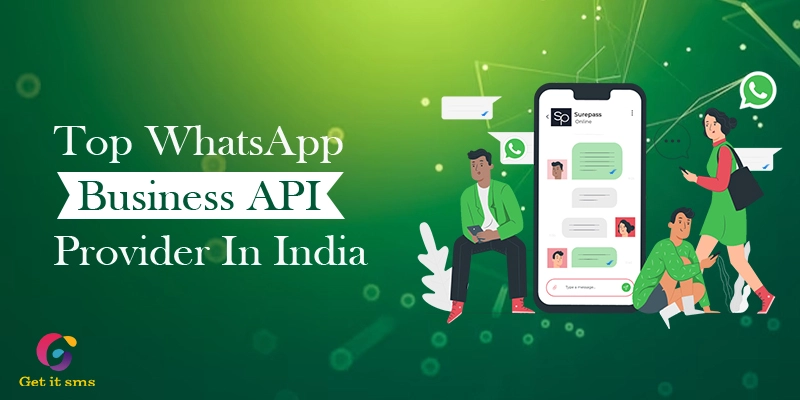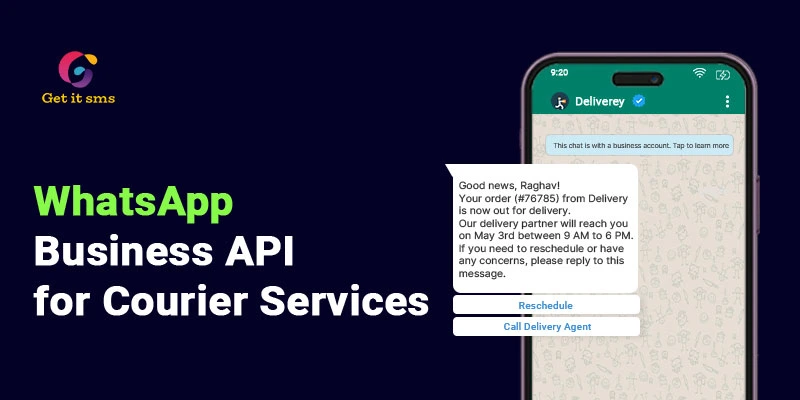Want To Send Bulk SMS?
If yes, then test our service for FREE.
Get a 1 Month Free Trial of WhatsApp Business API
Are you looking for WhatsApp authentication vs. bulk SMS authentication? You are at the right place. What if we say that employing WhatsApp authentication techniques can secure your WhatsApp conversations from attackers and spammers? Want to know how? Continue reading the article!
WhatsApp has become a widely used and popular application worldwide, along with its user authentication feature. Whatsapp authentication is the process of ensuring customers’ messages and other media files are encrypted and secured from unauthorized access. It verifies the identity of users before enabling access to specific systems or apps.
Authentication, whether this is used for WhatsApp or Bulk SMS, is an important part of security to guarantee that only verified people can access the important details or system. This is a quick introduction to WhatsApp authentication Vs. Bulk SMS authentication.
Proceed further to learn how WhatsApp is used for user authentication and how we can implement it in our business workflow along with its benefits or features!
What is SMS Authentication?
SMS authentication is a 2FA or Multi-Factor authentication to secure the customer’s sensitive data. Clients who sign in to receive text messages via an authentication code. They have only to fill in the code on the platform to receive access.
Multiple social media platforms like Twitter, Instagram, and Google generally integrate this.
The extra layer of security in the form of Two-factor authentication gives possession-based verification which means only the person who receives a digit code can access the data. Hence, one who needs unauthorized access can attack your details and get your password or phone details.
What is WhatsApp Authentication?
WhatsApp authentication is the method used by the WhatsApp platform to authenticate and recognize user identity, using it as a way of verification. Authentication through WhatsApp verifies and proves the identity of users to access the login. This WhatsApp authentication considers two primary methods: user-initiated flow and Business-initiated flow.
User-Initiated: In the User-Initiated Flow, users send a pre-filled sign-in request after clicking “Continue with WhatsApp” to initiate a chat with a verified business number. Users quickly get an approve button after sending. When users click this button, they are effortlessly logged in and redirected to the original app or website.
Business-Initiated: In the Business-Initiated Flow, users log in to the app or website by providing their phone number. Following the process, consumers’ WhatsApp app displays an approve button from a verified WhatsApp business number. When users click this button in the WhatsApp chat, they are seamlessly logged in and are sent to the app or website from where they originally arrived.
Key Differences Between WhatsApp and SMS Authentication
In the modern era, protecting online details and customer communication have become important. Two popular methods for authentication, WhatsApp and SMS are used increasingly. As both of them are implemented to recognize user identity, they function differently and give various advantages and cons. Let’s check them in detail;
1. Platform Dependency
Whatsapp Authentication – it depends on Whatsapp application usage, and how the customers need it to install the application on their mobile phones. In terms, it works through the internet and needs an active WhatsApp profile.
SMS authentication – it works on any phone that enables text messages. It does not need an internet connection like messages are communicated through regular networks. This makes the application more accessible to clients without having smartphones or with restricted connectivity.
2. Security
Whatsapp authentication – the app provides an end-to-end encryption technique, meaning that the content shared over the app is secured and encrypted, i.e., only the sender and receiver are able to check the messages. It provides more protection in terms of sensitive information security.
SMS authentication – this is less safe as compared to WhatsApp. SMS messages are encrypted while transferring messages and can be blocked via SIM card swapping or other exposures. It is easier to attack or access information.
3. User Experience
Whatsapp authentication – generally, it delivers a smooth user experience. Since users are known with the application and share information on the internet, the application usually sends quick and more robust delivery times, especially in countries with strong internet connectivity.
SMS authentication – it offers slower authentication, especially in regions with weak signal or network connection. Even some users can experience late in attaining SMS messages, which can result in a violation of the authentication process.
4. Global Reach
Whatsapp authentication: WhatsApp is most widely used by people globally, especially in regions with strong internet connections. However, it could not be as effective in places where WhatsApp is not mostly used or where users do not have access to robust internet solutions.
SMS authentication: SMS has a huge reach as it is not based on internet connectivity and works on most mobile phones. It is universally acknowledged, especially in places where mobile phones are more popular than smartphones with internet setups.
5. Cost
Whatsapp authentication – the application is free of cost for users and businesses as well, as it utilizes the internet more than old mobile network services.
SMS authentication – it can raise extra charges, especially for international messages. The business usually charges for sending SMS, making it a bit costly option for companies that are required to send authentication messages on a large scale.
6. Reliability
Whatsapp authentication: WhatsApp is mostly functional in areas with good internet connectivity; it can be impacted by poor internet network or app downtime, which can be late or control authentication.
SMS authentication: SMS is more based in countries with weak connectivity, as it is based on mobile network coverage. However, this is not resistant to problems like network outages or signal interference that can cause delivery delays.
7. Richness of Features
Whatsapp authentication: WhatsApp offers more engagement and personalization. It helps to attach media files as well, like images and videos. Doing this improves the security process by allowing two-factor authentication or presenting additional verification abilities.
SMS authentication – it is much simpler and only allows plain text to be sent. While it’s helpful for sending OTP or verification codes, it reduces the multimedia functions of WhatsApp.
How to Use WhatsApp or SMS for Authentication?
Below are the use cases of WhatsApp Vs. Bulk SMS authentication, underlining how every method is used around multiple sectors:
1. Banking and financial solutions
- WhatsApp Authentication: WhatsApp is used by most businesses nowadays to enhance the security and privacy of customers. Financial industries are rapidly adopting WhatsApp for user identification. WhatsApp enables end-to-end encryption and immediate delivery. This is perfect for sending transactional alerts, OTPs, and also two-factor authentication. Few banks also provide client services with WhatsApp, making it ideal for users to access their details safely.
- SMS Authentication: SMS authentication is still popular in the financial industry for authentication. Banks mostly use SMS to send OTPs and verification codes to customers for signing in to their online banking apps, authorizing payments, and resetting passwords. SMs are universally accessible, guaranteeing that customers in countries with limited internet connectivity can protect their financial profiles.
2. E-commerce Platforms
- WhatsApp Authentication: ecommerce sectors might leverage WhatsApp for authenticating clients during account making, login, and payment verification. Its quick delivery and capability to send multimedia messages like receipts, order updates, and delivery confirmations make it a versatile option for industries to connect audiences at large levels. Plus, WhatsApp encourages businesses to send promotional messages, order updates, and custom deals as well.
- SMS Authentication: the technique utilized by e-commerce companies for account authorization, order updates, and payment confirmations. Multiple online vendors need clients to authenticate their phone numbers with SMS during the sign-up process. SMS is generally used to send one-time passwords for safe checkouts and verify delivery updates.
3. Social Media Platforms
- WhatsApp Authentication: WhatsApp is used by social media platforms for multi-factor authentication (MFA), which enables users to utilize WhatsApp conversations to verify their login attempts. WhatsApp is being utilized more and more as a second factor of authentication in cases of suspected login activity or password resets because it provides real-time communication and is more secure than SMS.
- SMS Authentication: One popular technique for verifying social media users is SMS. SMS is frequently used by social media sites like Facebook, Instagram, and Twitter for login alerts and account recovery. When signing in from a new device or location, users can receive OTPs via SMS to confirm their identity.
4. Government Services
- WhatsApp Authentication: government businesses in a few regions use WhatsApp to verify users using public services, filing taxes, and completing other important tasks. WhatsApp’s widespread popularity allows governments to target citizens easily and safely. Other tasks, like notifications regarding updates, deadlines, and appointment confirmations, are usually shared through WhatsApp, improving service delivery and conversation.
- SMS Authentication: government businesses mostly use SMS for customer verification. This is for registering an event, programs receiving public health notifications, or accessing voter recognition; this solution is used most. And available to everyone for the brand populations, without requiring internet or smartphones.
5. Online Education and Learning Platforms
- WhatsApp Authentication: In online learning platforms, WhatsApp is utilized to connect with students in every manner during the sign-up or login method. The best method to boost conversation between teachers, students, and parents is for quick support and updates about exams or class schedules.
- SMS Authentication: SMS is often employed by educational channels for account verification and exam authentication. Lead to protect the login process by sending OTPs. It is also used to remind students about upcoming classes, deadlines, or new course offerings. This is suitable for both mobile and smartphones; it guarantees that students in remote or underdeveloped sites have available education-related updates.
6. Healthcare and Medical Services
- WhatsApp Authentication: Medical industries, telemedicine services, and healthcare solutions are growingly using WhatsApp for patient authentication and secure interaction. WhatsApp is integrated to send OTPs for login to the medical portals, appointment alerts, prescription details, and medical consultation guarantees. It gives an extra touch of security while keeping patients informed.
- SMS Authentication: Medical sectors completely depend on SMS authentication to interact with their people for appointment reminders, test result updates, and patient identity confirmation. This is also used to send alerts or medication schedules. This is widely used as a dependable option for targeting patients, mostly in sectors with low connectivity.
7. Job Applications and Recruitment
- WhatsApp Authentication: During the employment process, companies and recruitment agencies may utilize WhatsApp to confirm job candidates. Employers can communicate with prospective employees more directly by using WhatsApp to transmit verification codes or interview information. Additionally, WhatsApp allows candidates to securely submit papers, ask questions, and communicate with recruiters in real time.
- SMS Authentication: In the recruiting sector, SMS is often used to confirm application submissions, send interview invitations, and validate job applicants’ phone numbers. SMS is perfect for reaching a large number of people because it is compatible with all mobile devices, particularly in areas where internet or smartphone connection is limited.
8. Travel and Hospitality
- WhatsApp Authentication: Travel and hospitality businesses are also using WhatsApp to verify bookings and offer secure check-in authentication. For example, airlines might send boarding passes and flight updates through WhatsApp, ensuring that travelers have access to important details and securely. Hotels also use WhatsApp for guest recognition and authentication and to send key cards or booking confirmations.
- SMS Authentication: SMS is still a popular choice for authenticating and offering flight or hotel check-in details. SMS is utilized for sending flight updates, booking reminders, and check-in codes, making it simple for travelers to make available their travel details without requiring an internet connection.
Frequently Asked Questions
Q1. Is WhatsApp OTP verification secure?
A. Yes, OTPs shared through WhatsApp are safe and secure to authenticate user access. WhatsApp OTPs especially enjoy good security as WhatsApp messages are end-to-end encrypted.
Q2. How to understand WhatsApp authentication?
A. WhatsApp authentication is the method used by the WhatsApp platform to authenticate and recognize user identity, using it as a way of verification.
Q3. Which is more helpful in terms of security, SMS or WhatsApp?
A. Both approaches are utilized in business for customer communication, but WhatsApp is considered more secure as compared to SMS. Because it offers end-to-end encryption that only the sender or receipt can read messages.
Q4. What is the difference between WhatsApp or SMS authentication?
A. WhatsApp is installed on the smartphone and runs over an internet connection. Still, SMS enables sending messages without required internet connectivity. WhatsApp is considered more secure due to its end-to-end encryption technique.
Q5. How to utilize WhatsApp authentication?
A. WhatsApp authentication can be used in multiple businesses like Banking, financial, e-commerce, online education, healthcare, government, etc.
Conclusion
Hence, WhatsApp authentication vs. Bulk SMS authentication have particular use cases based on their context and service needs. WhatsApp’s rich features, end-to-end encryption, and real-time conversation make it the perfect choice for businesses who want to secure their customers’ sensitive details from attackers. While Getgabs has the features that set it apart from WhatsApp, this works especially in places with limited internet access, making it a one-go method for authentication in wide areas.
Thus, decide your choice on how you can protect your business along with effective customer communication. Go with your choice and secure confidentiality!
Recent Posts







 within 24
Hrs +
60
Days Free API Panel
within 24
Hrs +
60
Days Free API Panel



